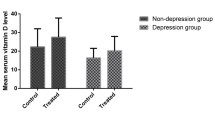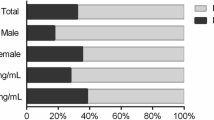Abstract
Background
Depression is common in chronic kidney disease (CKD) patients and associated with significant increase in morbidity and mortality. In recent years, a relationship between vitamin D deficiency and depression has been shown. The aim of this study is to investigate the relationship between 25-hydroxy (OH) vitamin D and depression in hemodialysis patients.
Methods
A total of 140 patients were included in the study. Hamilton depression scale (HAM-D) was completed by all patients. 25(OH) vitamin D levels were compared between patients with and without depressive symptoms.
Results
Patients who had depressive symptoms had significantly lower 25(OH) vitamin D levels (13.70 [24.3–8.25] vs. 18.20 [29.2–11.7] ng/mL, p = 0.016). HAM-D score showed significant association with gender (p = 0.011) and 25(OH) vitamin D level (p = 0.011). Univariate logistic regression analysis showed that males had lower risk of depression by a ratio of 61.1% (OR 0.389, p = 0.012) and vitamin D-deficient patients had 2.88 times greater risk of depression compared to non-deficient patients (OR 2.885, p = 0.013). Multivariate logistic regression analysis showed that males had 53.7% less risk of depression (OR 0.463, p = 0.046) and vitamin D-deficient patients had 2.39 times greater risk of depression (OR 2.397, p = 0.047). When evaluated by gender, univariate logistic regression analysis showed that 25(OH) vitamin D and other variables were not associated with depression in females (p > 0.05), while only vitamin D level had a significant effect on depression in males (OR 8.207, p = 0.008).
Conclusions
We found a significant association between vitamin D level and depressive symptoms in hemodialysis patients. When analyzed according to gender, this association was found to stand independent of other variables only in males.




Similar content being viewed by others
References
Vellekkatt F, Menon V. Efficacy of vitamin D supplementation in major depression: a meta-analysis of randomized controlled trials. J Postgrad Med. 2018. https://doi.org/10.4103/jpgm.JPGM_571_17.
Kgaergard M, Joakimsen R, Jorde R. Low serum 25-hydroxyvitamin D levels are associated with depression in an adult Norwegian population. Psychiatry Res. 2011;190(2–3):221–5.
Gois PHF, Wolley M, Ranganathan D, Seguro AC. Vitamin D deficiency in chronic kidney disease: recent evidence and controversies. Int J Environ Res Public Health. 2018;15:1773.
Semaan V, Noureddine S, Farhood L. Prevelance od depression and anxiety in end-stage renal disease: a survey of patients undergoing hemodialysis. Appl Nurs Res. 2018;43:80–5.
Kaynar K, Songul Tat T, Ulusoy S, Cansiz M, Ozkan G, Gul S, Bektas O. Evaluation of nutritional parameters of hemodialysis patients. Hippokratia. 2012;16(3):236–40.
Kittiskulnam P, Carrero JJ, Chertow GM, Kaysen GA, Delgado C, Johansen KL. Sarcopenia among patients receiving hemodialysis: weighing the evidence. J Cachexia Sarcopenia Muscle. 2017;8(1):57–68.
Aydemir O, Ergun H, Soygur H, Kesebir S, Tulunay C. Major depresif bozuklukta yaşam kalitesi. Türk Psikiyatri Derg. 2009;20(3):205–2012.
Ozyuksel B, Ulug B. Depresyon tanısı alan hastalarda kalıntı belirtilerin yetiyitimi ile ilişkisi. Türk Psikiyatri Derg. 2007;18(3):161–9.
Al Saraireh FA, Aloush SM, Al Azzam M, Al Bashtawy M. The effectiveness of cognitive behavioral therapy versus psychoeducation in the management of depression among patients undergoing haemodialysis. Issues Ment Healthy Nurs. 2018;39(6):514–8.
Coulibaly G, Goumbri P, Ouedraogo N, Dabilgou A, Napon C, Karfo K, et al. Factors associated with depressive symptoms in chronic hemodialysis patients of centre hospitalier universitaire Yalgado Ouedraogo (Burkino Faso). Nephrol Ther. 2016;12(4):210–4.
Hu A, Xue Z, Mwansisya TE, Zhou A, Pu W, Chen X, et al. Major depressive disorders in hemodialysis patients in China. Asia Pac Psychiatry. 2015;7(1):78–84.
Hemmelgarn BR, Manns BJ, Quan H, Ghali WA. Adapting the Charlson Comorbidity Index for use in patients with ESRD. Am J Kidney Dis. 2003;42:125–32.
Holick MF. Vitamin D: its role in cancer prevention and treatment. Prog Biophys Mol Biol. 2006;92(1):49–59.
Ishimura E, Nishizawa Y, Inaba M, Matsumoto N, Emoto M, et al. Serum levels of 1,25-dihydroxyvitamin D, 24-25-dihydroxyvitamin D in nondialyzed patients with chronic renal failure. Kidney Int. 1999;55:1019–27.
Stefanowski B, Wojcinska AA, Swiecicki L. The effect of vitamin D3 deficiency on the severity of depressive symptoms. Overview of current research. Psychiatry Pol. 2017;51(3):437–54.
Jhee JH, Kim H, Park S, Yun HR, Jung SY, Kee YK, et al. Vitamin D deficiency is significantly associated with depression in patients with chronic kidney disease. PLoS One. 2017;12(2):e0171009.
Kim JK, Park MJ, Song YR, Kim HJ, Kim SG. Vitamin D: a possible modifying factor linking obesity to vascular calcification in hemodialysis patients. Nutr Metab. 2017;14(1):27.
Jean G, Souberbielle JC, Chazot C. Vitamin D in chronic kidney disease and dialysis patients. Nutrients. 2017;9(4):328.
Ravani P, Malbarti F, Tripepi G, Pecchini P, Cutrupi S, Pizzini P, et al. Vitamin D levels and patient outcome in chronic kidney disease. Kidney Int. 2009;75(1):88–95.
Dusilova-Sulkova S, Safranek R, Vavrova J, Horacek J, Pavlikova R, Palicka V. Low dose cholecalciferol supplementation and dual vitamin D therapy in haemodialysis patients. Int Urol Nephrol. 2015;47(1):169–76.
Sezgin G, Ozturk G, Turkal R, Caykara B. Vitamin D levels of outpatients admitted to a University Hospital in the Marmara Region of Turkey over 3 years. J Med Biochem. 2019;38(2):181–7.
Looker AC, Johnson CL, Lacher DA, Pfeiffer CM, Schleicher RL, Sempos CT. Vitamin D status. United States, 2001–2006. NCHS Data Brief. 2011;59:1–8.
Ćwiek A, Czok M, Kurczab B, Kramarczyk K, Drzyzga K, Kucia K. Association between depression and hemodialysis in patients with chronic kidney disease. Psychiatr Danub. 2017;29(Suppl 3):499–503.
Eid RS, Gobinath AR, Galea LAM. Sex differences in depression: insights from clinical and preclinical studies. Prog Neurobiol. 2019;176:86–102.
Kuehner C. Why is depression more common among women than among men. Lancet Psychiatry. 2017;4(2):146–58.
Caccamo D, Ricca S, Curro M, Ientile R. Health risks of hypovitaminosis D: a review of new molecular insights. Int J Mol Sci. 2018;19:892.
Milaneschki Y, Shardell M, Corsi AM, Vazzana R, Bandinelli S, Guralnik JM, et al. Serum 25-hydroxyvitamin D nad depressive symptoms in older women and men. J Clin Endocrinol Metab. 2010;95(7):3225–33.
Lee DM, Tajar A, O’Neill TW, O’Connor DB, Bartfaj G, Boonen S, et al. Lower vitamin D levels are associated with depression among community-dwelling European men. J Psychopharmacol. 2011;25(10):1320–8.
Jorde R, Sneve M, Figenschau Y, Svartberg J, Waterloo K. Effects of vitamin D supplementation on symptoms of depression in overweight and obese subjects: randomized double blind trial. J Intern Med. 2008;264(6):599–609.
Abedi P, Bovayri M, Fakhri A, Jahanfar S. The relationship between vitamin D and postpartum depression in reproductive-aged Iranian women. J Med Life. 2018;11(14):286–92.
Zhou Q, Shao YC, Gan ZQ, Fang LS. Lower vitamin D levels are associated with depression in patients with gout. Neuropsychiatr Dis Treat. 2019;15:227–31.
Lardner AL. Vitamin D and hippocampal development-the story so far. Front Mol Neurosci. 2015;8:58.
Berridge MJ. Vitamin D and depression: cellular and regular mechanisms. Pharmacol Rev. 2017;69:80–92.
Nowak KL, Chonchol M. Does inflammation affect outcomes in dialysis patients? Semin Dial. 2018;31(4):388–97.
Nanri A, Mizoue T, Matsushita Y, Poudel-Tandukar K, Satom OM, Mishima N. Association between serum 25-hydroxyvitamin D and depressive symptoms in Japanese: analysis by survey season. Eur J Clin Nutr. 2009;63:1444–7.
Markaki AG, Charonitaki A, Psylinakis E, Dimitropoulakis P, Spyridaki A. Nutritional status in hemodialysis patients is inversely related to depression and introversion. Psychol Healthy Med. 2019. https://doi.org/10.1080/13548506.2019.1612074.
Alston H, Burns A, Davenport A. Loss of appendicular muscle mass in haemodialysis patients is associated with increased self-reported depression, anxiety and lower general healthy scores. Nephrology (Carlton). 2018;23(6):546–51.
Oliveira CM, Costa SP, Costa LC, Pinheiro SM, Lacerda GA, Kubrusly M. Depression in dialysis patients and its association with nutritional markers and quality of life. J Nephrol. 2012;25(6):954–61.
Song BM, Kim HC, Rhee Y, Youm Y, Kim CO. Association between serum 25-hydroxyvitamin D concentrations and depressive symptoms in an older Korean population: a cross-sectional study. J Affect Disord. 2016;189:357–64.
Black LJ, Jacoby P, Allen KL, Trapp GS, Hart PH, Byrne SM, et al. Low vitamin D levels are associated with symptoms of depression in young adult males. Aust N Z J Psychiatry. 2014;48(5):464–71.
Rainville JR, Hodes GE. Inflaming sex differences in mood disorders. Neuropsyhopharmacology. 2019;44(1):184–99.
Valdivielso JM, Jacobs-Cacha C, Soler MJ. Sex hormones and their influence on chronic kidney disease. Curr Opin Nephrol Hypertens. 2019;28(1):1–9.
Author information
Authors and Affiliations
Corresponding author
Ethics declarations
Conflict of interest
The authors have declared that no conflict of interest exists.
Ethics standards
The study was approved by the Ethics Advisory Committee of the Selcuk University (approval number: 201944).
Informed consent
Informed consent was obtained from all patients (oral and written).
Additional information
Publisher's Note
Springer Nature remains neutral with regard to jurisdictional claims in published maps and institutional affiliations.
About this article
Cite this article
Yavuz, Y.C., Biyik, Z., Ozkul, D. et al. Association of depressive symptoms with 25(OH) vitamin D in hemodialysis patients and effect of gender. Clin Exp Nephrol 24, 63–72 (2020). https://doi.org/10.1007/s10157-019-01794-7
Received:
Accepted:
Published:
Issue Date:
DOI: https://doi.org/10.1007/s10157-019-01794-7




